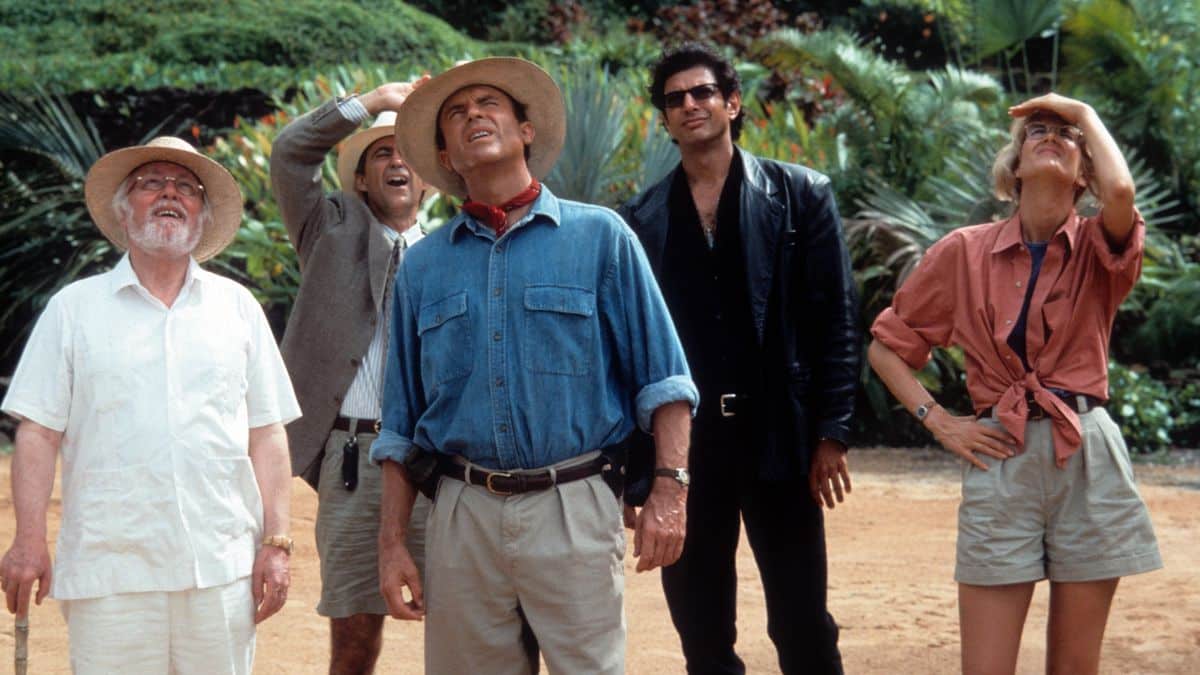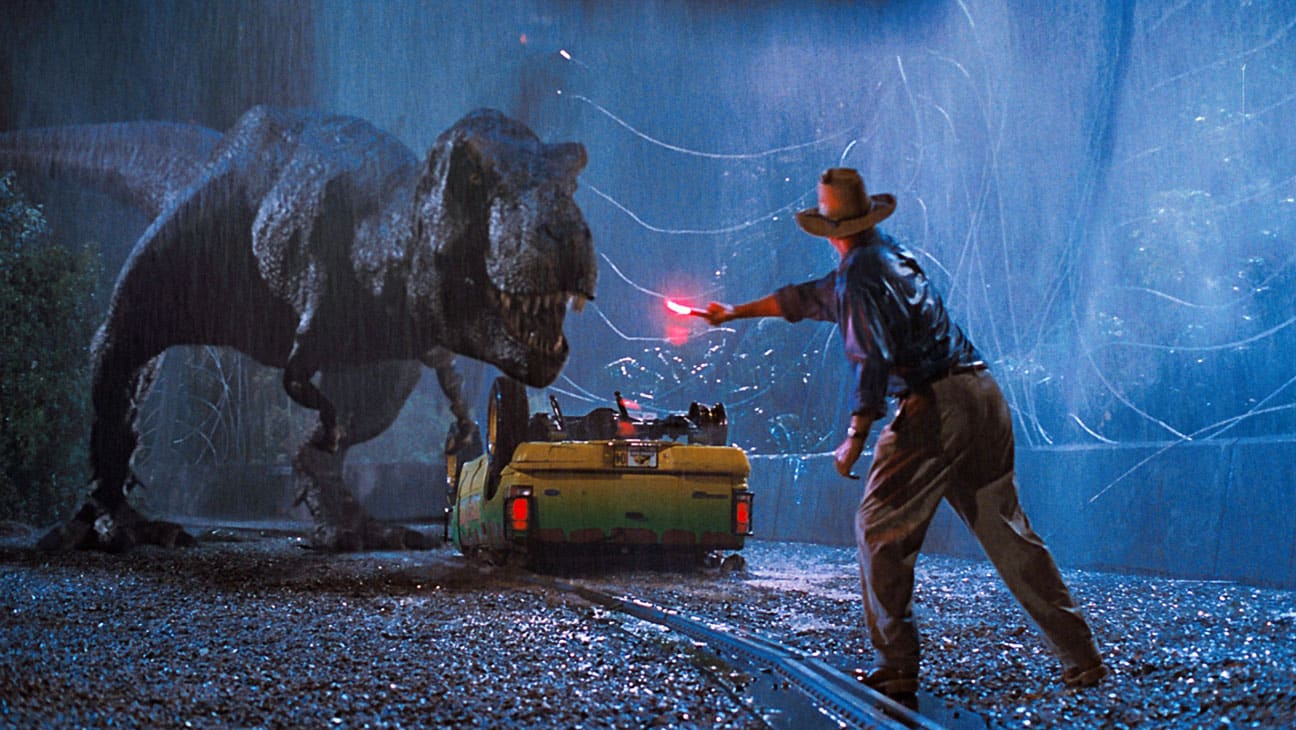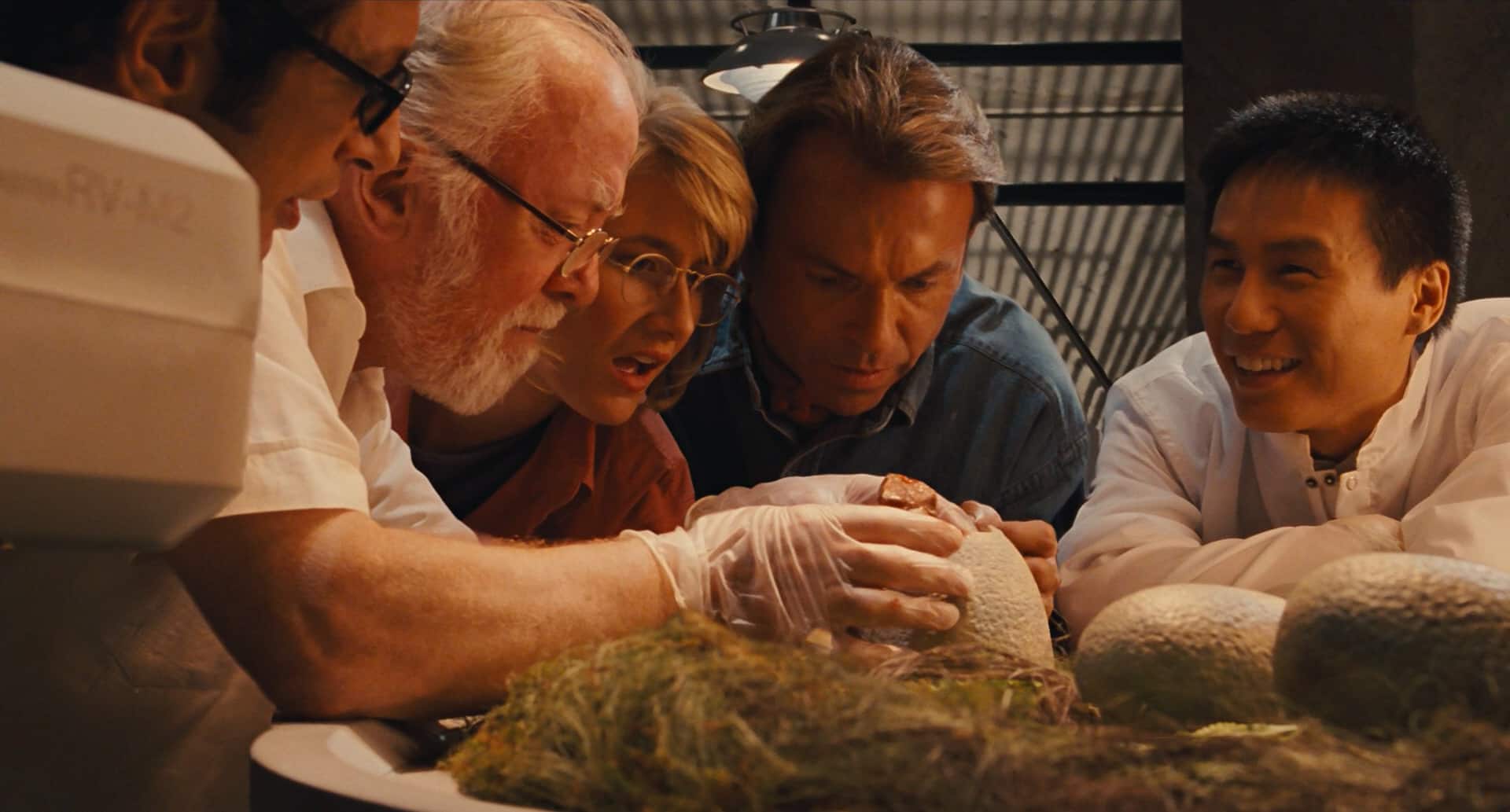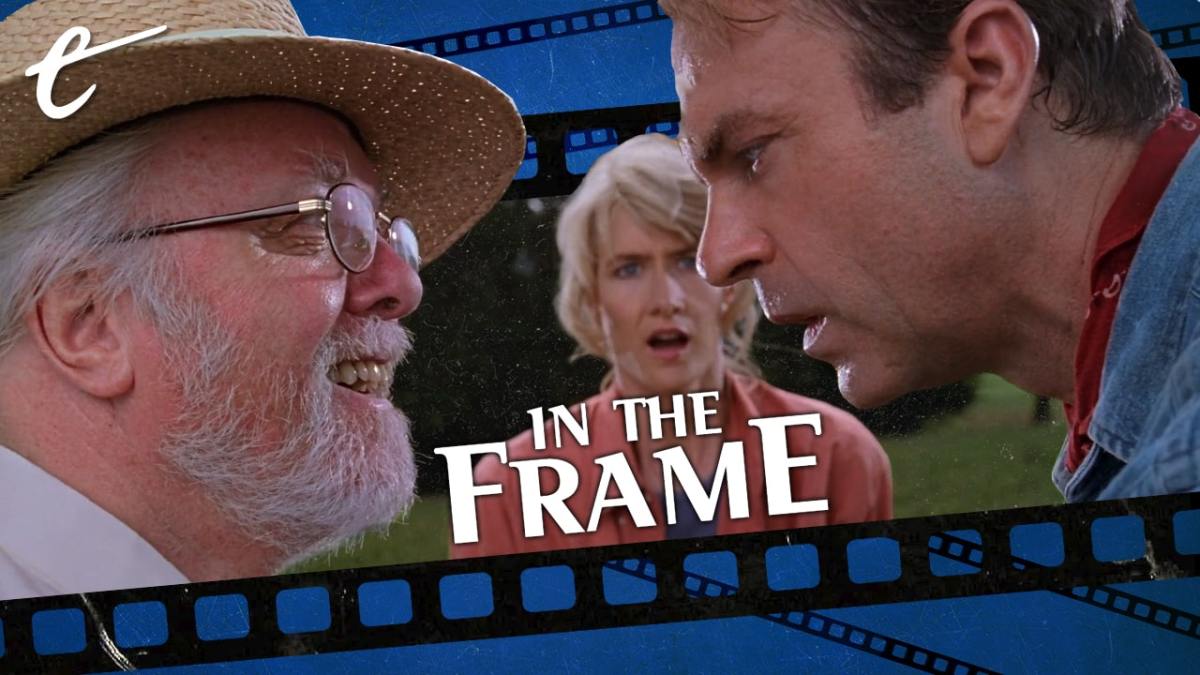In hindsight, Jurassic Park looks like a warning.
Much of Jurassic Park is given over to ethical debates about the morality of cloning dinosaurs. While that’s perhaps an actual debate worth having, rewatching Jurassic Park at a remove makes it seem like the characters are debating the legacy of the movie itself. When Ian Malcolm (Jeff Goldblum) chides John Hammond (Richard Attenborough) for his hubris in creating something that he does not understand and cannot fully control, it seems like he’s talking about more than just the park itself.
Jurassic Park holds together more than a quarter of a century after its own release. It is a masterpiece of blockbuster cinema, a perfectly constructed thrill ride featuring compelling characters, fantastic set pieces, and an enduring sense of awe. So much of Jurassic Park is given over to what might be described as “the Spielberg face,” to characters reacting in wonder and awe. However, the beauty of Jurassic Park is that the audience responds in the same way.
Jurassic Park casts a long shadow. It has topped the box office four times in its release history, including a stint at drive-ins during the pandemic. It is the slowest movie to reach $1B at the box office, a testament to its endurance rather than a reflection of any initial failure. Like Steven Spielberg’s Jaws, it profoundly impacted the shape of blockbusters that would follow. In fact, Spielberg had been drawn to Jurassic Park in the hopes of making “a good sequel to Jaws, on land.”
Along with Independence Day three years later, Jurassic Park redefined what summer blockbusters looked like. It’s possible to see the DNA of Jurassic Park in films like Frank Marshall’s Congo, Roland Emmerich’s Godzilla, or Peter Jackson’s King Kong. However, its influence was much more pervasive than relaunching the creature feature genre. Jurassic Park demonstrated what was possible in terms of special effects, only to watch much less talented directors take all the wrong lessons from it.

However, what’s particularly striking about Jurassic Park is the level of artistry on display. Spielberg is one of the best blockbuster directors in the history of cinema, and Jurassic Park is a showcase for him. The film spends about half its runtime basking in awe and wonder before transitioning to terror and horror. Notably, Spielberg demonstrates remarkable restraint with his spectacle. He brings a skill and grace to Jurassic Park, one largely lacking from both the sequels and the films that it inspired.
Like Hannibal Lecter is only on screen for upward of 16 minutes of The Silence of the Lambs, dinosaurs only appear for 14 minutes of Jurassic Park. Depending on whom you ask, only four or six of those minutes involve computer-generated imagery. Those few minutes changed filmmaking. Tron had played with computer-generated imagery over a decade earlier and had been “credited with (or blamed for) delaying CGI-based cinema for a decade.” Jurassic Park made up the lost ground.
By 1995, Hollywood had fully embraced computer-generated imagery. Casper was the first feature-length live-action film with a computer-generated 3D lead character. Toy Story was the first fully computer-animated film. Even Jumanji pushed these effects forward, computer-generating large groups of animals. No longer limited by the constraints of practical special effects, blockbusters could scale upwards. Carnage could be rendered on a planetary or even galactic scale.
These effects are relatively cheap for major studios, largely due to exploitation of the companies rendering them. The visual effects company Rhythms & Hues declared bankruptcy two weeks before winning an Oscar for its work on Life of Pi. More than that, very few directors understand how to use special effects as effectively as Steven Spielberg, which arguably contributes to disasters like Cats. It seems like Jurassic Park opened its own Pandora’s box for blockbuster filmmaking.
Hammond has been read as a stand-in for Spielberg. As such, Malcolm’s criticisms feel particularly pointed. “I’ll tell you the problem with the scientific power that you’re using here: It didn’t require any discipline to attain it,” Malcolm warns Hammond. “You stood on the shoulders of geniuses to accomplish something as fast as you could, and before you even knew what you had, you patented it and packaged it and slapped it on a plastic lunchbox, and now you’re selling it — you want to sell it!”

Indeed, this is arguably the true horror of Jurassic Park. The film didn’t create the modern Hollywood franchise – that honor arguably belongs to The Empire Strikes Back and Return of the Jedi. However, Jurassic Park arrived as that style of blockbuster seemed to hit an evolutionary threshold. The original Jurassic Park attracted criticism because of those plastic lunch boxes, as parents worried its Happy Meal tie-ins and toy figurines were being sold to audiences too young to watch it.
In an era where Spielberg’s old friend Martin Scorsese talks about franchise films as “theme parks,” Jurassic Park feels unsettlingly prescient. Jurassic Park is a horror story of stunted evolution. It is a cautionary tale about resurrecting a lost past as an empty spectacle, with little respect for its actual context or content. “How can you know anything about an extinct ecosystem?” asks Ellie Sattler (Laura Dern). “You have plants in this building that are poisonous. You picked them because they look good.”
Jurassic Park ends with Alan Grant (Sam Neill) staring at birds from the helicopter. Grant appreciates these birds as the evolutionary next step of the dinosaurs. That metaphor is lost in a pop culture defined by hollow nostalgia. In an era where recycled intellectual property is just repurposed and reworked, where old franchises see their DNA hybridized with the superhero genre and expanded out to build entire universes, Jurassic Park is increasingly timely.
This theme plays out in Jurassic World, the record-breaking relaunch and brand extension from June 2015. Jurassic World is, in every way, as cynical a film as the same month’s Terminator Genisys. It doubles down on many of the themes of Jurassic Park. Indeed, the idea of opening a branded theme park where the attractions “eat the tourists” seems less ridiculous in the wake of Disney’s efforts to reopen Disneyland (and fans’ eagerness to go) in the midst of a global pandemic. However, Jurassic World never sees this as horror.

Jurassic World coldly argues that the current blockbuster market has stripped away the magic of the original Jurassic Park. “Twenty years ago, de-extinction was right up there with magic,” explains Claire Dearing (Bryce Dallas Howard). “These days, kids look at a Stegosaurus like an elephant from the city zoo.” The magic is gone. The worst part of Jurassic World is that the film doesn’t care, so long as it gets to use the original doors from that iconic scene and play John Williams’ iconic score.
Jurassic World strips out all of the wonder, awe, and majesty that made Jurassic Park. Much like the characters in the film create a new hybrid dinosaur driven by focus groups, Jurassic World strips out any hint of irony in the cautionary tale at the heart of Jurassic Park. In the end, Jurassic World renders Jurassic Park as precisely the sort of hollow spectacle that Ian Malcolm railed against and treats it as a nostalgic triumph – a resurrection of a lost past by those who don’t understand it.
After all, Jurassic Park was a story of the folly of men trying to create and control these creatures. John Hammond’s attempt to “imprint” on each of his creations does little to stop everything from falling apart. In contrast, Jurassic World insists that these creatures can be controlled. Owen Grady (Chris Pratt) does “imprint” on his velociraptors, becoming their “alpha.” The climax of Jurassic World is a triumph of empty nostalgia, as the T-Rex from the original Jurassic Park teams up with the velociraptors to defeat the new Indominus Rex, asserting the victory of familiarity over novelty.
Jurassic Park was a nightmare about getting trapped in a nostalgic theme park run amok. Jurassic World doesn’t care so long as it gets a nice T-shirt out of the experience. Perhaps we should have listened to Ian Malcolm. Perhaps it’s time to let these spectacles evolve.






Published: Jan 29, 2021 11:00 am